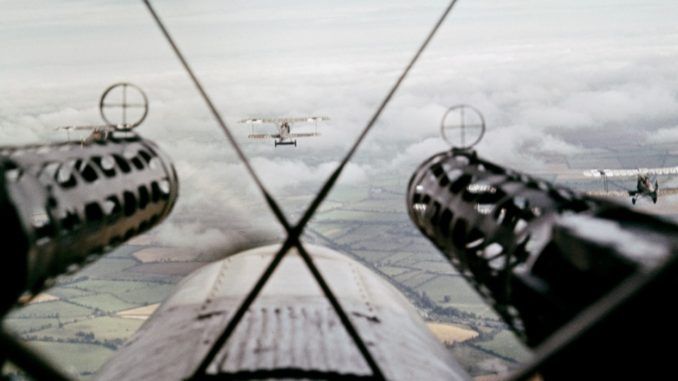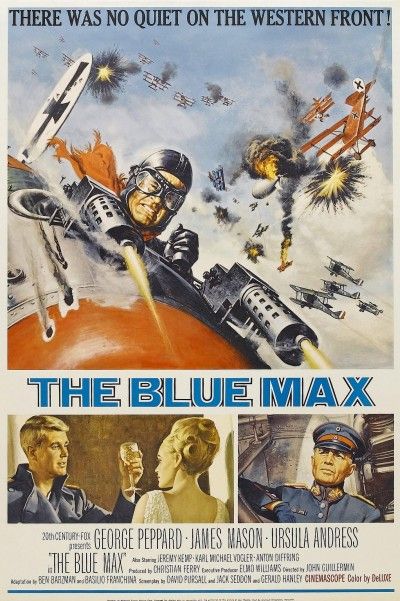
Rating: B-
Dir: John Guillermin
Star: George Peppard, Karl Michael Vogler, Jeremy Kemp, Ursula Andress
The reputation here is of a film with great flying sequences, which is bloated beyond that. While I can’t argue with the first half of that, I do think it has things to offer beyond empty aerial spectacle. Admittedly, 156 minutes (including an intermission!) is too long. But the majority of it is interesting, and well-shot. It takes place in the later stages of World War I, when Leutnant Bruno Stachel (Peppard) transfers from the infantry to become a fighter pilot. The other squadron members, under Hauptmann Otto Heidemann (Vogler), look down on the new arrival, due both to his lower-class background, and his single-minded dedication to earning the titular medal, awarded for shooting down twenty enemy aircraft, which offends their sense of chivalry.
Those in charge of the military, however, see an opportunity in Stachel, setting him up as a propaganda tool, since he can be portrayed as one of the common people. Stachel, meanwhile, sees an opportunity in Käti Gräfin von Klugermann (Andress), the wife of a high-ranking official (James Fox). Käti is, to be frank, a bit of a slut, since she’s already having an affair with her nephew (Kemp), one of Stachel’s comrades in flight, before switching her attentions to him. However, as the war begins to turn against the Germans, she wants to high-tail it to Switzerland. When he refuses to abandon his post, his enraged bit of Eurototty tells her husband perhaps not all of Bruno’s claimed kills belonged to him, potentially causing an unacceptable scandal.
 Certainly, you come to this for the amazing dog-fights and other flight set-pieces. Even almost sixty years later, these are top-tier, likely as good as those in the Top Gun movies. Half the time, you’re right there in the cockpit with Bruno like a first-person shooter (top), though arguably more impressive are the wide shots of planes spiralling around each other in beautifully controlled chaos. Yet I was also impressed by the political shenanigans, and the way in which the state and the hero are looking to use each other. It reminded me of Rollerball, with which this shares cinematographer Douglas Slocombe. Though Bruno is considerably less of a heroic figure than Jonathan, and the ending here is… more cynical, shall we say.
Certainly, you come to this for the amazing dog-fights and other flight set-pieces. Even almost sixty years later, these are top-tier, likely as good as those in the Top Gun movies. Half the time, you’re right there in the cockpit with Bruno like a first-person shooter (top), though arguably more impressive are the wide shots of planes spiralling around each other in beautifully controlled chaos. Yet I was also impressed by the political shenanigans, and the way in which the state and the hero are looking to use each other. It reminded me of Rollerball, with which this shares cinematographer Douglas Slocombe. Though Bruno is considerably less of a heroic figure than Jonathan, and the ending here is… more cynical, shall we say.
That said, there is still a lot of filler, in particular the relationship between Bruno and Käti, which serves little or no purpose until the very end of the film. It’s a typical role for Andress i.e. look pretty and sound foreign. It’s weird how neither her husband nor her original boyfriend seem concerned about her moving on to Stachel: I kept expecting some kind of a duel, in line with Prussian military considerations of “honour”. These soap-opera elements have not stood the test of time well, though looking at the contemporary reviews, they largely appear to have been seen as the weakest element at the time too. But as a showcase for practical effects, without the benefit of CGI, or largely even models, it’s one of the decade’s most impressive.
